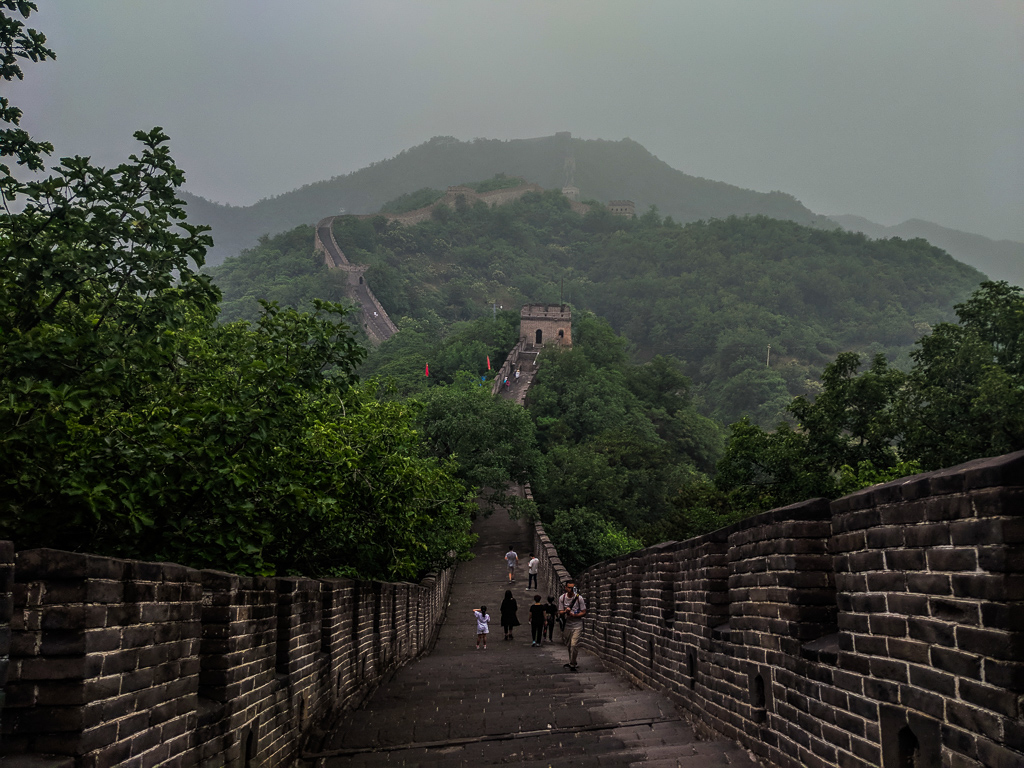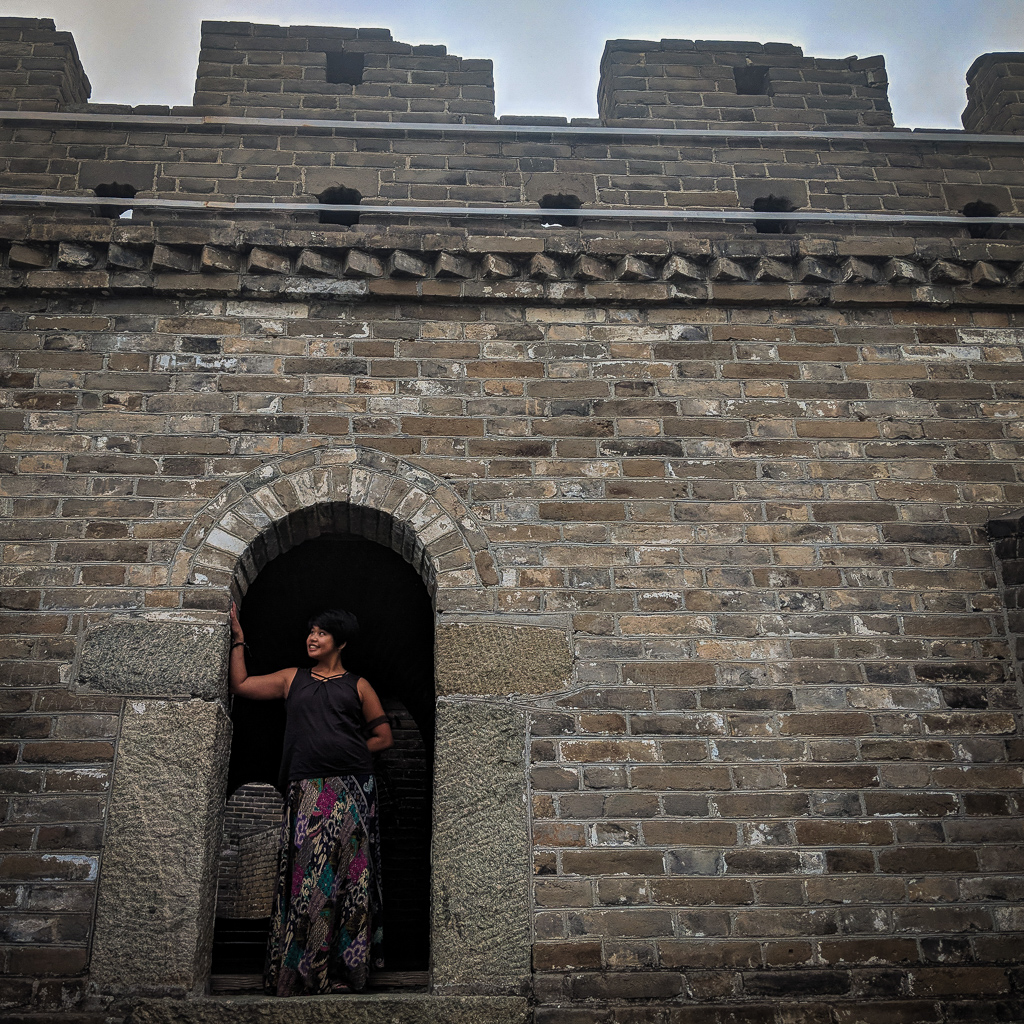24 Hours in Beijing—Visiting the Great Wall

The most affordable flight back the the U.S. from Luang Prabang landed me in two Chinese cities over the course of two days. My first overnight layover was in Kunming, China, located in the southern Yunnan province. The second overnight layover was in Beijing.
How to Get Around China as an English Speaker
English is a language frequently used in tourist destinations, especially southeast Asia. It’s part of the reason why the region is so backpacker friendly! However, once you start heading north towards east Asia, particularly China, getting around gets significantly more difficult if you don’t speak Chinese.
Before you travel to China, I recommend doing the following:
- Download a VPN client on your phone and computer (FYI—Google Pixels do not work in China at all); Express VPN worked very well for me.
- Download WeChat (this is helpful if you need to contact a Chinese number—WhatsApp, Facebook, Instagram, and Google are all blocked in China)
- Download the regional maps on Maps.me, as well as Chinese in Google Translate. Make sure they work offline.
- Book accommodations at an English-friendly hotel
- Write the address of your accommodations down in Chinese
Kunming, China
I arrived in Kunming after 5pm and spent some time stuck in immigration. If you have a layover that is less than 72 hours, you’re allowed through immigration without having to get a Chinese visa. However, since I had a double layover in China, they weren’t sure how to process my papers, so they ended up just using my tourist visa from before.



Beijing, China
I did not realize that it would be so easy to visit the Great Wall in the limited time I was in Beijing. Apparently, there are tour companies that will pick you up from the airport, drive you to the Great Wall, and then take you back to the airport so that you make your flight. If you have a solid 8 hours in Beijing, I would recommend doing this.
My plan for the long layover was to stay at a hostel in the Old City and explore the area in the evening, then head out to the Mutianyu Great Wall first thing in the morning.
I tried memorizing a few key phrases in Chinese and screenshotting my directions to help me get from the airport to my hostel, but that proved to be useless when the Chinese greeted me with blank stares. Also, Google Maps didn’t have the correct address. I ended up in the wrong neighborhood (I was in Hutong instead of the financial district, which were 45 minutes apart) and having to go door to door until I found an English speaking hostel worker to help me write directions in Chinese so that I could find my way. Once I had the magic card with the Chinese address, getting around became immensely easier.



It’s fairly easy to get around by train in Beijing once you know where you’re going. I ran into a bit of confusion once I reached the alley where my hostel was located (no signage), but one of the locals was kind enough to walk me to the correct nondescript door.

I had booked a car through Jenny’s Car Service at the last minute (I highly recommend them. They’re super responsive and have great service), but despite my 5:30am wakeup call, stayed up late talking to some of the other hostel guests. There was a kid from the Navajo tribe in Utah who was absolutely ecstatic about being able to take a picture with the Navajo flag on the Great Wall. His family owns a touring service that takes you through Monument Valley and other natural attractions throughout the Utah/Arizona area, so if you’re ever looking to tour in the area, let me know and I’ll connect you with them. (The world is a wonderful place. Seriously.)
Eventually I went to bed and woke up bright and early for my journey to the Great Wall.
Mutianyu Great Wall
I don’t think I could have had a more perfect ending to my trip. My driver, Fred, rolled up in the tiny unmarked alley in front of my hostel at exactly 6am. The street markets were beginning to open, so the alley was full of pedestrians, motorbikes, and cyclists. Fred spoke great English and uttered obscenities that echoed my internal monologue of frustrations regarding travel around Beijing.
After navigating through the maze that was the Old City, we finally reached the highway. The drive to the Great Wall would take a total of two hours, possibly more due to the fact it was a Chinese holiday, so we had a lot of time to talk. He was also the first person I was able to really talk to about having to come home early, my fears and doubts about what I was going to do next, my disappointment at not being able to go to Vietnam, and my struggle with China. I will not talk about my struggle with China on a public forum because it’s very personal and uninformed, but being a quarter Chinese and feeling completely disconnected from my Chinese heritage (which is the opposite of how I felt in the Philippines) garnered a lot of feelings.
So essentially, I got a free therapy session thrown into the car service, and Fred got an intense lesson on the English language.

Anyway, after a cut throat battle for parking, Fred was kind enough to buy me breakfast. We reached the Great Wall around 8am. You’re able to do a 45-minute hike up to the Wall, but since I was short on time, I took a lift up to the top.

Manmade structures have never rendered feelings from me outside of respect or appreciation. But as I walked across the Great Wall, I had to remember to breathe. It’s old. It has history. It has spirit. I don’t consider myself a spiritual person, but standing there, virtually having the entire Wall to myself at that moment, I started crying.



I didn’t expect to end my trip at the Great Wall. I didn’t expect to feel so bothered by the disconnect I felt with my Chinese heritage, nor did I expect to feel such a connection to the Philippines. The Navajo kid I talked with at the hostel mentioned his connection with the land in Utah.
The Great Wall was built to defend the Chinese from Mongolians and other invaders.
I am a product of colonization.
I stood at the top of the stairs in front of one of the towers as a group of American tourists climbed up the stairs.
“This sucks. Imagine being the Mongols having to climb all these steps with their weapons and armor,” one said.
“Just wait until you get to the next set of stairs,” I chirped. “Then the real fun begins.”
The group wandered through the tower and I heard a yell from the other side. “Oh dear God, she wasn’t joking!”

Most Americans don’t realize the power of the U.S. passport. It grants us the ability to travel almost anywhere in the world, no questions asked. Friends from the States have asked me if the rest of the world hates America because of Trump. They don’t. They don’t think much about us, actually. The rest of the world is busy dealing with a different, but similar, version of crazy. And if they do have an opinion of us, it’s that we’re expensive. And we work too much. And we speak great English.

I took a toboggan down to the base of the mountain. Two older men dressed in samurai outfits tried to get me to take my picture with them. They asked for money, which I acquiesced.
We’re all just trying to get by somehow.
Fin.
Fred drove me to the airport at 11am, leaving plenty of time to catch my 1:40pm flight back to Chicago.
“If you’re ever back in Beijing, call me,” he said.
If there’s anything I’ve learned on this trip, it’s that most people are inherently kind. And sometimes, people do shitty things like charge you way too much money for the wrong bus, but if you actually spend some time talking with them, their actions paired with their circumstances make sense.
The Chinese may have passed me around like a hot potato when I was trying to find my hostel in Beijing, but at least they tried. Trying is most of the battle.
Let’s all try to be kinder to each other.